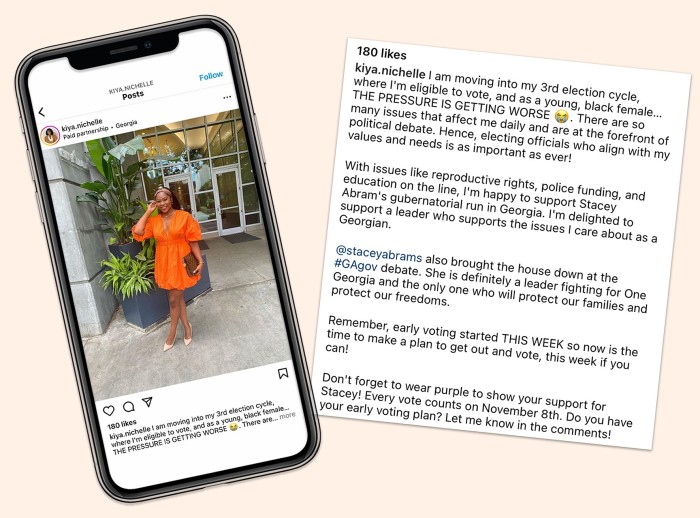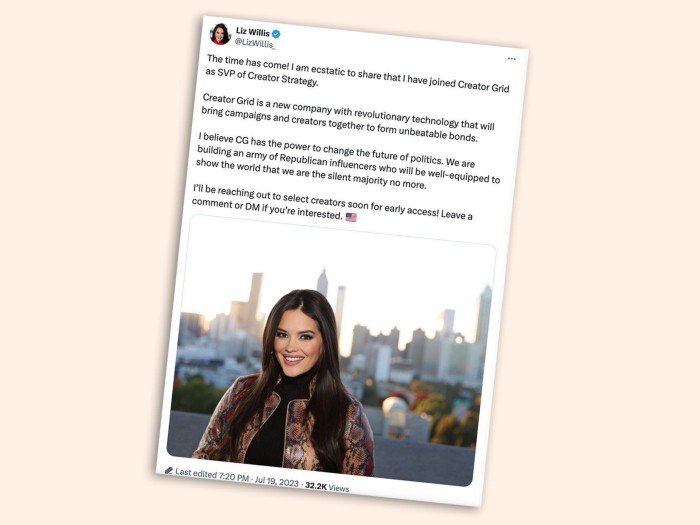US campaign groups are spending millions of dollars to hire social media influencers with modest followings, seeking to sway voters from niche communities in tightly fought elections across the country in November.
President Joe Biden has been wooing celebrity influencers, recently hosting a White House reception with several hundred viral internet stars with millions of followers, including actor Kalen Allen and artist Devon Rodriguez. Republican presidential candidate Donald Trump has also courted high-profile conservative influencers such as Chaya Raichik, who is behind the X social media account “Libs of TikTok”.
According to multiple operatives and strategists, there has also been an explosion of political marketing groups focused on deploying less renowned social media users who typically have hundreds to tens of thousands of followers.
Both left and rightwing groups believe “microinfluencers” command trust and are a cheap way to reach a younger electorate, as well as minorities such as black and Latino voters. These social media users, some of whom do not usually address politics, are lured with three to six figure payouts in what remains a loosely regulated space.
“It’s been a trend line since 2016 that the most powerful messengers in politics have been real people, people from the community that look like your neighbours,” said Bradley Beychok, president of left-leaning super political action committee American Bridge 21st Century. He forecast 2024 would be the “most robust social media influencer campaign cycle that we’ve ever seen”.

The push comes as many Generation Z voters shun television and newspapers in favour of consuming news from social media content creators. Meanwhile, new privacy changes and restrictions introduced by Apple and Google have made it more difficult to target political advertising.
American Bridge expects to spend more than $1mn on “creator programmes” in 2024, after investing around $250,000 in that during the 2022 midterms, said one person familiar with the spending plans. American Bridge’s Beychok declined to comment on its plan.
Priorities USA, one of the largest democratic super Pacs and advocacy groups, also plans to spend $1mn on its first creator programme in the 2024 election cycle, according to a person with knowledge of the plans, which were first reported by Politico.
On the left, there is a network of influencer marketing groups that has sprung up to cater to Democratic Pacs and advocacy groups, including Vocal Media, People First and Social Currant.
Liz Willis, a broadcaster who joined right-leaning marketing group Creator Grid in July, has said the group is “building an army of Republican influencers who will be well equipped to show the world that we are the silent majority no more”. The group could not be reached for comment.

Another fledgling conservative group, Influenceable, describes itself as “an influencer management platform and agency used by brands, organisations, and campaigns in the anti-woke economy”. An investigation by the Texas Tribune in August found that the platform was linked to oil billionaire Tim Dunn and former Trump campaign digital chief Brad Parscale.
“When it’s this close and it’s razor margin, and the states are winner takes all, it feels like there are hundreds of tiny things that make or break — and influencer marketing is arguably the biggest thing that can help sway races,” said Stuart Perelmuter, chief executive of political influencer marketing group AtAdvocacy, which has a roster of more than 300 mid-size and celebrity creators aligned with the Democratic party.
“Fox News on a prime time night gets 1mn views. We are getting 100mn through our network on a day-to-day basis,” he added.
In 2020, then democratic presidential candidate Mike Bloomberg used a platform called Tribe to pay an army of creators to generate memes at $150 per post. The campaigns and supporters of Trump, Bernie Sanders and Andrew Yang all made similar efforts around the 2020 election.
The efforts have become more sophisticated over time. Rob Perry, chief executive of XOMAD, one of a handful of groups that caters to both sides of the political spectrum, said his firm uses artificial intelligence to identify nano or micro-influencers, users with up to 10,000 or 100,000 followers respectively, with the right profile for his clients.
“The benefit is you can geotarget — getting local community leaders,” he said.
Some influencers are being offered “performance-based incentives”, said Tim Cameron, chief executive of media strategy firm FlexPoint Media, adding marketing groups are touting technology that “measures conversions” — when a piece of paid-for content prompts an action from a user such as a donation, petition sign-up or email address registration.
But he noted that working with smaller influencers does “require human hours to go through and vet, and broker arrangements with them”.
Experts warn that there are no federal regulations around paid political content from influencers, leaving it up to individuals and the groups they work with to decide whether they disclose their affiliations. Rules on the social media platforms vary too.
Others are cautious that such messaging may be off-putting for their existing followings.
Stephanie Williamson, a Kentucky-based creator who regularly posts make-up videos and has 21,000 followers on Instagram, received a three-figure sum for creating a post in support of the state’s governor Andy Beshear. She was required to keep the video on the platform for several weeks after the state vote, but has since removed it from her profile.
“Politics can be quite polarising, unlike beauty and fashion,” said Williamson.
TikTok is seen as a platform of choice for some campaigns. Nearly a third of 18 to 29-year-olds said they regularly get their news on the short-videos platform, according to research by the Pew Research Center. TikTok does not allow regular political advertising.
But XOMAD said several Republican campaigns do not want to use TikTok because of national security concerns given its Chinese parent ByteDance. Another marketing consultant to right-leaning groups said that they advised clients to steer clear of the platform for the same reason. Biden’s campaign recently set up a TikTok account, even though he has previously raised similar concerns.
Betsy Hoover, founder and managing partner of Higher Ground Labs, a venture fund focused on investing in progressive political technology, said she expected to see more “mid-size and down ballot” campaigns using influencers as “the artificial intelligence revolution has increased the importance of trusted messengers, especially when people are concerned about deepfakes and misinformation in politics”.
Conservative group Turning Point USA fell under scrutiny in 2020 when it allegedly paid teenagers to flood the social media platforms with conservative messaging without disclosing their backing, falling foul of Meta and X rules on manipulation and prompting the platforms to delete some posts.
Turning Point said at the time that the campaign constituted “sincere political activism conducted by real people who passionately hold the beliefs they describe online, not an anonymous troll farm in Russia”.
Paul Barrett, adjunct professor of law at New York University, warned that misinformation and disinformation may be spread more easily by political influencers.
“If you’re selling eye make-up or a natural supplement — that’s neutral,” said Barrett. “But when it comes to deciding who is going to be our political leaders, I would prefer there was a different set of incentives in place.”
Additional reporting by Alex Rogers in Washington










